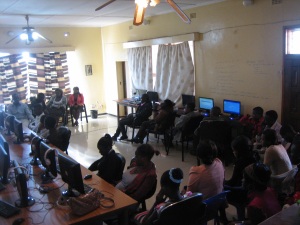I’ve lost count of the times I’ve had to explain what I was doing in Zambia – both while I was there and since I’ve been back in NZ. Unfortunately, “working for an impact sourcing company” just doesn’t have the same intuitive ring to it as “working at a school/hospital/orphanage/wildlife sanctuary”.
“Impact Sourcing is the socially responsible arm of the Business Process Outsourcing (BPO) and Information Technology Outsourcing industry. Impact sourcing intentionally employs people who have limited opportunity for sustainable employment—often in low-income areas.” (Rockefeller Foundation)
For anyone who doesn’t immediately recognise the ‘outsourcing’ industry, yes, it’s basically businesses lowering their costs by sending work to other parts of the world where you can pay people lower wages than at home. Cue images of sweatshops and incomprehensible call centre operators.
Impact sourcing, however, is none of these. While it operates on the same basic premise, it has an explicit social mission of providing valuable employment and skills to those at the bottom of the global economic pyramid. As the definition above mentions, impact sourcing largely involves BPO and ITO work such as data entry, web research, transcription, and customer support.
It’s a rapidly growing industry, too. The mammoth BPO and ITO industry is expected to be valued at $574 billion in 2015; impact sourcing is projected to have an almost 30 percent CAGR and account for 11% of this market, up from 4% in 2010 (Rockefeller Foundation). Like regular outsourcing, it remains most concentrated in south/south-east Asia, but is also rapidly growing in sub-Saharan Africa (South Africa, Ghana, and Kenya in particular).
There are a number of different models amongst the Impact Sourcing Service Providers (ISSPs): industry pioneer DDD combines employment with tertiary education, Samasource is non-profit and has a focus on women, and Cloud Factory uses its unique technology to break tasks down into tiny micro tasks. I worked for Impact Enterprises, a new entrant to the industry that focuses on partnering with startups.
After having mainly worked with non-profits over the last few years it was refreshing to work with a company that was turning a profit. I have, however, always been torn in my views about social enterprise: can it truly deliver social goods on a grand scale or is it just a capitalist wolf in sheep’s clothing?
While I still haven’t fully made up my mind, I’m pretty positive on the potential of impact sourcing. ISSPs aren’t just highlighting a nice spin-off benefit of their work while pursuing a profiteering, damaging, business-as-usual. They may epitomise aspects of the neoliberal economic project, but ISSPs don’t directly damage our environment and could employ thousands upon thousands of un- and under-employed in the global South while helping them develop 21st century skill-sets.
The lack of valuable employment, particularly for youth, women and minorities (all of whom are also increasingly educated), is without a doubt one of the greatest challenges facing developing economies. ISSPs can help address this through targeted hiring of the most disadvantaged (DDD in particular). While most clients are currently northern companies, there is also huge potential for South-South impact sourcing, particularly with regards to the digitisation of government records in Africa.
However, despite these positives, a question mark will always remain regarding their clients and the role they plan in an unjust international economy. While one hopes they would try to live up to their branding as ‘social enterprises’ when choosing their business partners, it cannot be taken for granted.
There’s a growing body of literature out there on impact sourcing, but key starting points are Impact Hub (a network for ISSPs and businesses interested in impact sourcing) and Rockefeller Foundation’s “Digital Jobs Africa” initiative (see the links to the reports by Accenture and Avasant).

